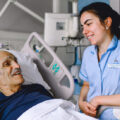Nursing encompasses autonomous and collaborative care of individuals of all ages, families, groups, and communities, sick or well, and in all settings. Nursing includes the promotion of health, prevention of illness, and the care of ill, disabled, and dying people. Advocacy, promotion of a safe environment, research, participation in shaping health policy and in patient and health systems management, and education are also key nursing roles.
A nurse is a person who has completed a program of basic, generalized nursing education and is authorized by the appropriate regulatory authority to practice nursing in his/her country.
Basic nursing education is a formally recognized program of study providing a broad and sound foundation in the behavioral, life, and nursing sciences for the general practice of nursing, for a leadership role, and for post-basic education for specialty or advanced nursing practice. The nurse is prepared and authorized
(1) to engage in the general scope of nursing practice, including the promotion of health, prevention of illness, and care of physically ill, mentally ill, and disabled people of all ages and in all health care and other community settings;
(2) to carry out health care teaching;
(3) to participate fully as a member of the health care team;
(4) to supervise and train nursing and health care auxiliaries; and
(5) to be involved in research.
In Nigeria, the nursing profession is regulated by Law. The Nursing and Midwifery Council of Nigeria (NMCN), is the sole governing body that regulates all cadres of nurses and midwives in Nigeria. It was established by government decree in 1979 and re-established as a parastatal by the government of Nigeria by Act Cap. No143 Laws of the Federation of Nigeria, 2004.
The Council maintains standards of practice and enforces discipline within the Nigerian nursing profession. It also accredits education in nursing and midwifery, awarding certificates and a diploma in midwifery and nursing after a three years programme. The Council is headed by a Registrar, who is helped by other professional and non-professional staff. They are responsible to a board reporting to the Federal Ministry of Health.
Qualities Of A Good Nurse In Nigeria
In Nigeria, culture plays an important role in the lives of separate individuals and the society as a whole. Culture helps to accumulate, control and organize the human experience. It is basically what makes a person human.
The work of a nurse in Nigeria is exceptionally gratifying, but it can also be demanding. To be both successful and happy in nursing, it helps to have certain personal characteristics and attributes. Here’s a closer look at the qualities that make a good nurse in Nigeria.
Quality #1: Empathy
Empathy is the ability to feel what another person is experiencing from their point of view. For nurses, it means putting themselves in their patient’s shoes and trying to understand how they perceive what’s going on around them. A patient who rings for assistance, and then watches helplessly from their hospital bed as nurses repeatedly walk by the door doesn’t see the dozens of others the nurse is trying to assist. They only see people who don’t seem to care about their needs.
But if a nurse stops momentarily to assure the patient help is on the way, it changes their entire healthcare experience and builds invaluable trust. Nurses work with vulnerable people from diverse backgrounds. If nurses are going to predict their patient’s needs accurately and understand their emotional responses to care, a strong sense of empathy is critical.
Not everyone is born with a robust capacity to be empathetic toward others, but most people lack empathy only because they don’t know the full range of circumstances others may have experienced in life and how it affected them. It’s something nurse educators have understood since the days of Florence Nightingale, and with the knowledge and training a nursing program provides, it’s a learnable skill.
Quality #2: Emotional Stability
A nurse’s job is mentally demanding. Each day can bring a range of powerful emotions including joy, surprise, sadness, and frustration. Tough situations are all in a day’s work for a nurse, but to effectively manage the needs of colleagues, patients, and their family members, remaining calm when faced with upsetting experiences is essential.
Does that mean nurses shouldn’t be bothered by difficult and even devastating circumstances? No, emotional stability should never be confused with a lack of emotions or empathy. It just means that for nurses to give people the care and psychological support they need, they must be able to control their responses to focus on the tasks at hand. Research shows that emotionally stable nurses are better able to concentrate, solve problems and keep their patients safe.
Like empathy, emotional stability is a skill that can be learned, but it takes time, and nurses need to be patient with themselves. Diffusing intense reactions by reframing expectations, balancing perspectives, and remaining mindful are among the many effective approaches that can help.
Quality #3: Communication Skills
Top-notch communication skills are among the most important qualities for nurses. As a liaison between patients, doctors, and family members, nurses never stop collecting and relaying critical data. If someone drops the ball, the consequences can be devastating. Errors transcribing medication orders, missing information on hospital discharge paperwork, and life-threatening allergies not listed in a patient’s chart are common medical mistakes attributed to lack of communication. Under the right circumstances, these types of errors can cause significant harm. To communicate clearly, nurses need to be comfortable reading, writing, and presenting information to others verbally.
Communication is also a therapeutic tool healthcare providers use to build interpersonal relationships with their clients. Through proven verbal and non-verbal techniques, therapeutic communication helps nurses make patients feel more relaxed and willing to share their concerns. When dialogue flows freely in a professional relationship, healthcare providers are better able to do their job and outcomes improve for patients.
Lack of information about an illness, for example, can be a major source of fear and anxiety for patients. They may put off making difficult decisions or opt to decline care entirely rather than risk embarrassment by asking questions they believe will make them seem uninformed or unintelligent. By proactively sharing information instead of waiting to be asked, nurses give patients an opening to talk about what’s bothering them, helping them feel more comfortable and establishing a sense of trust.
From breaking down the barriers that block effective communication between colleagues to using therapeutic techniques to enhance dialogue with patients and family members, communication is the skill nurses use every day.
Quality #4: A Desire to Learn
Nursing requires a professional license because taking care of others safely when lives are at stake demands proven clinical skills. When students graduate from vocational school, it’s not expected that they know everything. Only that they can make sound decisions in complex circumstances based on evidence and best practice guidelines.
Healthcare is constantly evolving, and while nursing programs teach all the necessary clinical skills, most graduates will need practice and continuing education to reach full competency, particularly in specialty fields such as critical care, emergency medicine, and infusion therapy.
With this in mind, employers give new graduates plenty of supervised opportunities to learn from experienced nurses or through preceptorships and mentoring programs. As professionals, nurses are always responsible for self-evaluating their expertise and not taking on tasks that exceed their abilities without support or additional training. A healthcare provider’s oath is first and foremost to do no harm.
To be the kind of nurse someone would want to care for an ill or injured loved one requires a commitment to lifelong learning and motivation to stay on top of developments in the field. Nurses are expected to grow professionally through ongoing training opportunities and in most states, it’s required for license renewal. Graduating from a vocational school is a noteworthy accomplishment, but it’s just the beginning.
Quality #5: Critical Thinking
Critical thinking is the ability to evaluate facts and come to rational conclusions objectively. It’s a disciplined, self-directed way of looking at things that allow nurses to interpret data, prioritize patient needs, and troubleshoot difficult clinical issues quickly and accurately. During triage, for example, it’s how a nurse uses normal diagnostic results to determine that a patient having chest pain can wait because they are likely having indigestion, not a heart attack.
The ability to think critically is an important quality because while nurses most often function as part of a healthcare team, their practice is autonomous, and their professional decisions are their sole responsibility. Nurses may be able to dress wounds in seconds, place urinary catheters without faltering or start an intravenous line with a blindfold on, but without the ability to think on their feet, high-pressure situations will be stressful.
Although not all healthcare settings are as extraordinarily fast-paced as a busy emergency room, making decisions isn’t something nurses can avoid. The good news is that while critical thinking comes naturally to some people, it’s also a skill that can be learned and nurtured in school and beyond.
Quality #6: Open-Mindedness
Nurses see patients from every walk of life. Some have had vastly different experiences that affect their thinking and behavior, while others may have unconventional opinions about healthcare that can be difficult for nurses to accept.
A patient who declines a blood transfusion because of their religious beliefs, a parent who won’t vaccinate a child because of safety concerns, and a terminally-ill client who chooses to forgo life-sustaining treatment all present unique and emotional challenges. For nurses, the principle of autonomy, a patient’s right to make their own healthcare decisions without undue influence, always takes priority, regardless of the choices they make.
Today’s nurses are also required to be culturally competent. Cultural competence is defined as the ability to care for patients with different languages, customs, and beliefs. Working with interpreters, assigning religiously sensitive patient providers of their preferred gender, and respecting the need for modesty during physical examinations are some of the ways nurses are called upon to help.
Few people enter the nursing field without the desire to help others achieve better wellness, but within the boundaries of a professional and therapeutic relationship, only by being open-minded can nurses provide effective, culturally competent, and patient-centered care.
Quality #7: Versatility
No student wants to hear that a job in healthcare may require working weekends, holidays, and over time, often without notice. Work-life balance is increasingly important to people, and it’s essential to managing stress, but the truth is that in facilities that provide around-the-clock care, emergencies happen.
The key to personal and professional satisfaction is for nurses to choose where they work based on what best fits their lifestyle. For example, a position in a hospital emergency room or on a labor and delivery floor will be exciting, but more likely to require extra hours when things get busy. Jobs in physicians’ offices, day camps, schools, or specialty clinics still offer variety and although they may be a little less glamorous, they usually come with Monday through Friday schedules, and holidays are rarely required.
Flexibility is one of the best parts of what a nursing career has to offer. Day, night, or evening hours, short or long shifts, and interesting opportunities in a wide range of settings are the norm. Being a nurse is one of the few occupations that can meet the needs of workers of all ages through the many different stages of their lives, and for a versatile nurse, the opportunities are boundless.
Quality #8: Respectfulness
Nigeria is a hierarchical society. Age and position earn, even demands, respect. Age is believed to confer wisdom so older people are granted respect. The world is full of different and sometimes challenging personalities, and once people enter the healthcare system, even the kindest souls become exceptionally vulnerable. They’re asked to put their well-being in the hands of providers they may not know, and the lack of a personal relationship can lead them to lash out based on nothing more than fear. For nurses, respect is the boundary that defines a therapeutic relationship and makes it possible to take care of every patient.
Respect for the rules within the healthcare industry, however, is also important. As a field, medicine is notoriously slow to change. That’s because it’s evidence-based, and the processes required to ensure changes are made for the right reasons take time. Reimbursement for medical services is also inexorably tied to regulations set forth by insurers and government agencies, and the failure to follow them can mean the loss of revenue, financial penalties, or worse, closed doors.
Healthcare is a highly regulated industry, and rules are created to improve outcomes and patient safety, but they also increase workload and can even seem senseless sometimes, especially if they’re outdated. That can be tough for nurses who are impatient to see improvements they know will make their work easier and improve the lives of their patients Over time, this can create a gap between nurses, administrators, and policymakers that lead to professional discontent. For those with a rules-were-made-to-be-broken personality, a career in healthcare could feel restricting.
Students looking for a lifetime career in nursing need to brace themselves, recognize the importance of rules in medicine and be prepared to work within them, not around them.
Quality #9: Flexibility
For nurses, there’s no such thing as an average day. The excitement of learning new skills and consistently doing different things is part of the appeal of nursing as a career, but it also makes flexibility one of the top qualities every good nurse needs.
Nurses wear many hats on even an average day, but when challenges emerge, it requires the ability to adapt. A quiet day planned to care for neonates can suddenly become high-intensity when four women simultaneously arrive in labor.
Flexibility is also a characteristic that helps nurses adapt to changes in healthcare in general. For example, before awareness of blood-borne pathogen risks grew, using gloves regularly when working with bodily fluids was uncommon, but within just a few years, it became nearly mandatory. Today, technological advances are causing the landscape of medicine to shift constantly as innovations are introduced at breakneck speed. Being flexible helps nurses adjust to these types of changes with less stress.
Quality #10: Physical Stamina
Being a nurse requires the ability to bend, turn, twist, lift and stand regularly, sometimes for long periods. Healthcare facilities provide training and equipment to make these tasks less strenuous, and while that reduces costly staff injuries and improves patient safety, it doesn’t alleviate many of the physical demands of being on a busy orthopedic floor for 12 hours a day.
There are roles for nurses that require less strenuous physical activity than others including working in doctor’s offices or administrative positions, but to be successful and able to respond effectively to emergencies in fast-paced settings, it helps to have stamina.
Nursing skills are valuable regardless of physical ability, and not all nurses are track stars, but it helps to be in shape and own a few great pairs of comfortable shoes.
Quality #11: Assertiveness
Assertiveness is a person’s ability to express their thoughts and feelings and insist they be respected. It’s an honest, forthright way of communicating that allows an individual to stand up for his or her needs without being aggressive or impinging on the rights of others.
Aggressiveness and assertiveness are often confused. The fundamental difference between the two is that assertiveness is based on mutual respect and seeks solutions that are fair, whereas aggressiveness is manipulative behavior that wants a win at the expense of others.
Passive individuals have issues communicating their needs to others. They tend to avoid disagreements and go along with the crowd, but over time, that can lead to anger, resentment, and personal frustration. Assertive people understand that conflict can be both respectful and constructive when approached in the spirit of finding mutually equitable solutions.
As patient advocates, being assertive is something nurses must not only do for themselves but also on behalf of patients. That can occasionally put nurses at odds with both colleagues and the people they serve. A nurse who suspects a child is being abused, for example, is a mandatory reporter, but bringing the situation to the attention of authorities will likely cause conflict between the nurse and the child’s parents. Similarly, reporting an error or unethical behavior on the part of a colleague can create stress in the work environment, but as a professional, it’s a nurse’s duty.
Being assertive can feel uncomfortable, but it has tangible benefits. It boosts self-esteem and earns the respect of others. Teams in which members are free to discuss their thoughts honestly feel more relaxed, experience less stress and work together more cooperatively, improving both interpersonal relationships and ultimately, patient care.
Can a nurse learn to become more assertive? Absolutely! Like other therapeutic communication techniques, it takes practice, but anyone willing to change their communication style can learn to express themselves more effectively and with confidence.
Quality #12: Discretion
Today, medical information may only be exchanged between healthcare providers when necessary and with consent. For nurses, this means they can’t discuss a patient’s personal information with colleagues who are not involved in the case and certainly not with family and friends. Gone are the days when charts were hung at the foot of a patient’s bed. Nurses are expected to have the utmost discretion when it comes to handling medical data.
Quality #13: Reliability
Reliability means consistently doing what’s expected and doing it well. It’s a simple idea, but it’s easier said than done for nurses struggling to balance the needs of patients, employers, coworkers, and those to whom they are accountable outside of work.
In a busy healthcare setting, when one team member drops the ball, another has to pick it up. Tasks are rarely discretionary and can’t be put off until later. A nurse getting ready to leave for the day to meet with their child’s teacher may have to postpone if a patient emergency arises, and date night with a spouse may occasionally be spent working a double-shift because someone called out sick.
Thankfully, while reliability is a professional must, work-life balance is possible to achieve with strategies like taking positions with hours that make meeting other commitments easier and utilizing vacation and other paid time off efficiently. Most employers in the healthcare field know their staff makes sacrifices to keep things running smoothly, and they try to offer as much flexibility as possible.
Quality #14 Organizational Skills
Being organized is among the most vital qualities for nurses, and it encompasses several key skills including neatness, the ability to prioritize and delegate, and the expertise to manage time effectively.
Neatness
The average worker spends almost a third of their day looking for information. Of that, nearly an hour is lost due to disorganized workstations. Because most nurses work in technologically advanced facilities, computerization has taken some of the work out of keeping a desk neat, but there’s still plenty of paper to go around. In a busy healthcare environment, nurses don’t have an hour a day to waste chasing missing documentation, and misplacing paperwork could mean it lands in the hands of someone who shouldn’t have it, so neatness counts.
The Ability to Prioritize
Everything in healthcare is subject to prioritization, but because issues in a medical setting are continually evolving, nurses need to prioritize tasks at the start of their shift and re-prioritize them throughout the day as things change. It’s a rare day that ends with a to-do list that looks the same as when it started.
Triage, the process of prioritizing how and when patients receive care based on the severity of their condition, is an important concept in medicine, and it’s perhaps a nurse’s most vital role. Healthcare is a resource. It’s not possible for providers to be in more than one place at a time, so when multiple patients have needs, it takes knowledge and skill to prioritize them safely.
The Ability to Delegate
Delegation is a tough skill for some nurses to master. Being responsible for how someone else performs a job on your behalf is a significant responsibility. It’s tempting to try to do everything alone, but more gets done when nurses are willing to trust assistants and other trained staff members to assume duties that don’t require professional nursing attention. It frees them up to use their expertise where it’s needed most and makes patient care more efficient.
Time Management Skills
Everything in healthcare is time-sensitive. Giving medications, for example, is a large part of most nurses’ responsibilities and regulations strictly govern administration times. Doses given early or late can delay procedures and significantly affect outcomes. Patients need to be fed, washed, and taken to the bathroom on time while at any moment, an emergency could arise.
Nurses make it all work by planning, prioritizing, delegating, and making the most of every minute. It’s a tall order, but handling time wisely keeps a busy day from becoming overwhelming and helps reduce stress.
The good thing about organizational skills, in general, is that while they’re second nature for some people, they can be also be learned. Being organized is less of an innate ability than it is practicing good habits and using the right tools.
Computers in healthcare facilities, for example, use software that organizes task lists, sets up reminder systems and reorganizes priorities as they change. Most are even customizable to match a nurse’s preferences, and they eliminate laborious handwritten checklists.
Quality #15: Compassion
Compassion begins as empathy, but it’s more than an understanding of someone’s suffering, it’s the willingness to do something about it. As the cornerstone of nursing, compassion makes all the difference in the lives of people in need.
How do patients describe compassionate nurses? Words like kind, gentle, and caring top the list, but most equate compassion with doing the little things they don’t expect a nurse to do as part of providing medical care. For nursing students, it’s what teachers refer to as the need to holistically address the unique physical, emotional and social needs of each person as an individual, not as a collection of symptoms.
What does compassion look like? For a woman upset that she’s too weak to comb her hair before visitors arrive, it’s taking the time to do it for her. For parents who’ve lost a newborn, it’s giving them time to grieve at their own pace. Compassion means different things to everyone, and for nurses, the mission is to discover what those things are and act on them.
Quality #16: Ethics
A strong sense of right and wrong helps nurses work through challenges and gives them a moral compass with which to consistently make decisions that are in a patient’s best interests, especially when the right thing to do isn’t obvious.
From advocating for a patient’s wishes to telling them the truth about their condition, even when it’s something they’re uncomfortable hearing, situations occur every day in a nurse’s life that require ethical behavior, and it’s the very foundation upon which trusting therapeutic relationships are built.
Quality #17: Self-Care Ability
Nursing is a profession dedicated to caring for others, and it can be physically, emotionally, and mentally demanding. Long shifts, busy days, and coping with illness and death are stressful. Nurses are expected to meet a wide range of patient needs while remaining focused and attentive, and that emphasis on meeting the needs of others first often puts the nurse’s needs in the backseat.
While there is increasing awareness on the part of employers and nurse educators that self-care is critical to a healthy workforce, to avoid burnout, it’s up to nurses to take the lead and follow the same advice they give to their patients to take care of themselves.
The best way to reduce job-related stress is to set clear professional boundaries, work in areas of the field that allow a reasonable work-life balance, and take advantage of well-deserved time off without feeling guilty. This is not only good counsel for nurses, it’s better for patient care. Nurses slip up when they’re tired. Medication errors and incidents involving client and staff safety are among the top mistakes attributed to nurse fatigue.
The willingness to care for one’s body, mind, and spirit and the self-esteem necessary to understand that meeting their own needs helps them better care for others are the one prescription today’s nurses can’t work without. ALSO SEE: 20 Qualities and Characteristics Of A Good Counselor





